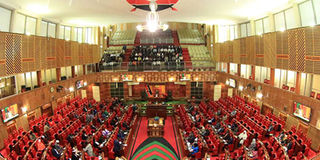Cheaper goods expected as MPs back tax bill

Members of the National Assembly in a session last year. PHOTO | FILE | NATION MEDIA GROUP
What you need to know:
The products whose prices are likely to come down slightly include electricity, sanitisers, detergents, newspapers, processed foods, phones, books, electronics, computer hardware and software.
But although they passed the 2020 Tax Laws (Amendment) Bill, lawmakers warned that the common man may not benefit from the move as envisioned by Mr Kenyatta.
You will soon be saving Sh2 for every Sh100 you spend buying goods and services that attract value-added tax (VAT).
This is after MPs endorsed President Uhuru Kenyatta’s proposal to lower VAT from 16 to 14 per cent to cushion Kenyans against economic shocks caused by Covid-19.
The products whose prices are likely to come down slightly include electricity, sanitisers, detergents, newspapers, processed foods, phones, books, electronics, computer hardware and software.
Most food items are already excluded from VAT and the prices will remain unchanged.
But although they passed the 2020 Tax Laws (Amendment) Bill, lawmakers warned that the common man may not benefit from the move as envisioned by Mr Kenyatta.
Debating the tax changes, MPs described the move as populist and warned that it may in the long-term be detrimental to the economy.
They promised to revisit the issue after the pandemic.
Kikuyu MP Kimani Ichungwah, who also chairs the Budget and Appropriations Committee, said the executive needs to be careful when introducing certain tax measures. “They must be cautious so that we don’t shoot ourselves in the foot,” he said.
Kipipiri MP Amos Kimunya warned that the National Treasury will regret the decision in three months.
“You cannot reduce VAT in an economy where prices are liberalised. The trader is not obligated to reduce the price; he can even increase it further. The only thing we know is that Treasury is going to lose Sh49 billion but we are not sure how the ordinary person is going to benefit,” said Mr Kimunya, a former Finance minister.
Homa Bay Town MP Peter Kaluma said VAT is the most reliable source of income for the government and hence its reduction without a corresponding reduction in the price of goods is not effective. “Let us oppose this so that the people who have more can buy and give to those who don’t have,” he said.
Kitui Central MP Makali Mulu said the government would have used the Sh49 billion projected loss to provide basic needs for people in informal settlements and rural areas.
The Parliamentary Budget Office (PBO) — the unit that advises lawmakers on financial, budgetary and economic matters — has warned that the revenues will drop by Sh122.2 billion between April and June if lawmakers adopt the tax cuts.
MPs will debate the income tax rate, known as Pay As You Earn (Paye) — which President Kenyatta proposed to be reduced from 30 to 25 per cent — next week.
Announcing the tax measures two weeks ago, President Kenyatta said the move will provide workers with additional income for spending to boost consumption while at the same time easing cash flow for companies and small businesses due to the lowering of corporate and turnover taxes.
Lawmakers also supported the creation of the Covid-19 Emergency Response Fund but warned that its proceeds must be used for the intended purpose.
“This is not any other kitty like the El-Nino Fund. I want to tell members of this committee that if they eat this money, they will die of the coronavirus,” said Suna East MP Junet Mohamed.
Mathira MP Rigathi Gachagua said members of the fund should focus on giving food to vulnerable Kenyans.
“We watch the Health CS every day giving an update on Covid-19 but nobody is talking about food. People are just talking about washing hands, staying at home, but Kenyans are waiting when they will be given food,” Mr Gachagua said.
The fund will be used to purchase essential supplies to control further spread of the viral disease.
The collections will be used to purchase medical consumables, equipment, medicine, protective gear, quarantine facilities, Covid-19 test kits, food, water, electricity, medical disposal bins and for logistics.
Part of the money will also be used to enhance the capacity of the relevant research institutions in handling Covid-19 surveillance.





